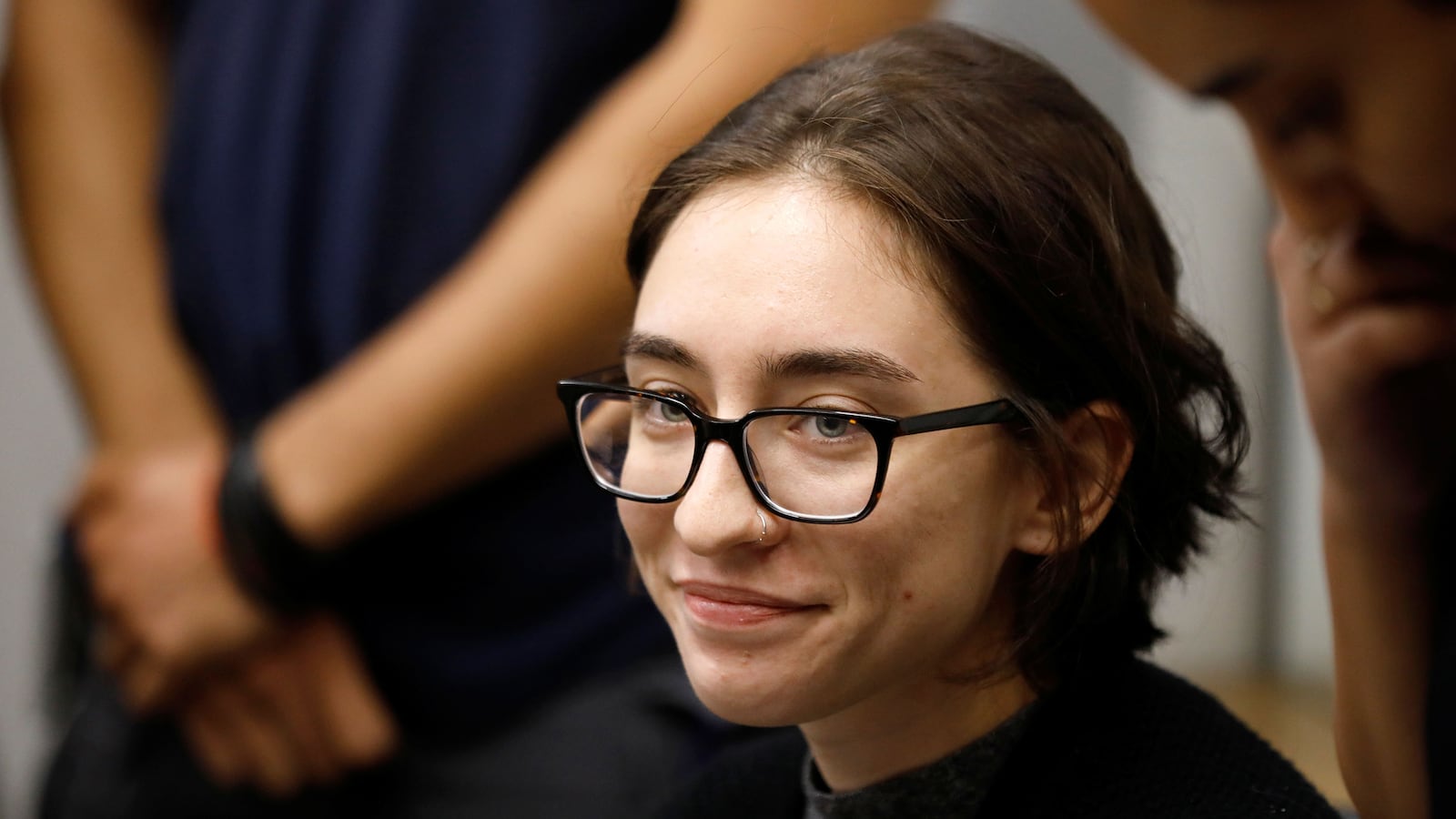TEL AVIV — The latest stage in Lara Alqasem’s strange route to graduate school involved a clutch of men, none of whom appeared to have much familiarity with social media, discussing just what it means to click the “attending” button on a Facebook event.
Alqasem is a 22-year-old American who registered to study human rights at a Hebrew University graduate program in Jerusalem, and obtained a student visa from the Israeli consulate in Miami.
The university semester starts on Sunday, October 14, and had she been allowed into the country Alqasem would have embarked upon her studies unnoticed, like every other year-abroad student.
Instead, the government of Prime Minister Benjamin Netanyahu—following a series of decisions that were deeply offensive to the American Jewish community and caused unprecedented Israel-diaspora friction—managed to unify its supporters and its detractors in opposition to its detention of a young Floridian who seems to pose no danger to the state.
On October 2, upon arrival at Ben-Gurion International Airport, Alqasem was barred from entering Israel on the grounds that she supports Boycott, Divest, Sanction (BDS), the anti-Israel movement with growing popularity on American college campuses.
In the first test of Israel’s 2017 anti-BDS law, Alqasem has been held at an airport facility for nine days as her case is appealed and she refuses reiterated offers to be deported back to the United States.
One fact is not disputed: While a student at the University of Florida, from which she graduated in May, Alqasem served as president of Students for Justice in Palestine (SJP), an organization affiliated with BDS, that advocates a wide-ranging boycott of Israel.
One of the Israeli state’s charges is that Alqasem participated in a boycott of Sabra hummus, a brand partly owned by the Israeli food conglomerate Strauss.
In an affidavit filed Thursday, Alqasem claims that her ideas have evolved in the past two years, and she no longer supports a boycott of Israel, pointing to her desire to study at an Israeli university as proof thereof.
But the state was not having it.
At Thursday’s session at the Tel Aviv district court, Yossi Tzadok, the state’s attorney, explained his claim that Alqasem remains a proponent of BDS based on her “clicking ‘attending’ on SJP events,” including on the post about Sabra hummus, which was presented to the court in the form of screenshots of her former Facebook page..
Since Alqasem deleted her profile before arriving in Israel, Tzadok said, “we have no way of showing it as evidence.
Responding, Alqasem’s attorney, Yotam Ben Hillel, asked “if someone clicks ‘attending’ on Facebook–does it mean she actually participated in the event? Is this the evidence you have?”
This, along with a few other Facebook posts, is pretty much what the state had.
Ben Hillel pointed out that Israel’s anti-boycott law defines actionable activity as “’deliberately avoiding economic, cultural, and academic ties because of its association with Israel.” Alqasem, he said, “came to study at the Hebrew University in Jerusalem, was accepted, paid money, and was issued a visa. How does that fit with advocating boycott? The state has not answered this.”
There is a high standard of proof before a visa can be revoked, Ben Hillel said, “which is not the case here. She invested money and time in moving to Israel. She doesn't have a job to return to in the United States and at this point it is too late for her to matriculate to an American academic program.”
Israel’s law blocking foreign BDS activists from entering the country was passed in March 2017. It grants the interior minister a wide breadth of personal discretion in determining who will be allowed in or be kept out.
On Thursday, Interior Minister Aryeh Dery waxed sardonic about Alqasem’s possible motivation for choosing to study in Israel.
“It's about time we show some national pride,” he said on a morning radio news program. “She acted against Jewish students. She remains detained as a matter of her own choice. What’s the deal? Did she finally see the light emanating from Zion? Aren’t there universities in the United States?”
Perhaps underscoring the arbitrary application of Israel’s law, Strategic Affairs Minister Gilad Erdan, who spearheads the Israeli government’s anti-BDS efforts, on Wednesday said that if he heard Alqasem “in her own voice apologize and forsake any belief in BDS, I’d consider letting her in.”
In a highly unusual step, the Hebrew University joined Alqasem’s appeal. Barak Medina, the university rector, asked on Thursday, “Why is the state concerned by this 22-year-old girl? What can possibly happen?”
Alqasem’s case was bolstered by Dror Abend-David, her former UF Hebrew professor, who wrote a letter to the Israeli newspaper Haaretz lauding his former student as someone with an “open and positive attitude toward Judaism, Jews, and the State of Israel.”
Alqasem’s detention has become a cause celebre within Israel and abroad. Two opposition lawmakers who visited her in detention attended Thursday’s court session.
The Israeli Association of University Heads expressed its opposition to Alqasem’s denial of entry, claiming, in a statement signed by Tel Aviv University President Joseph Klafter that, “The damage caused to Israel and Israeli academia as a whole, to the Israeli universities and particularly to Israeli scientists and researchers abroad by decisions of this kind could well exceed the potential damage, if any, of permitting her to enter Israel.”
He further accused the ministry of strategic affairs of reneging on an agreement to “make prior contact with the host academic institution or researcher inviting international students or foreign scientists to Israel–before an order to detain them at the airport is issued.”
Several of Alqasem’s former Florida professors also filed letters on her behalf with the court.
In one, Eric Kligerman, a professor of Jewish and German Studies whose Jewish studies seminars Alqasem attended, wrote that “her predicament is nothing short of the Kafkaesque. Although she has come to Israel to study justice, she now finds herself in limbo and held in custody, accused by faceless individuals by virtue of her presumed associations with the BDS movement.”
In The New York Times, two right-wing columnists, Bret Stephens and Bari Weiss, semi-humorously describing themselves as “Zionist fanatics of unhinged proportions,” noted that Israel is “a state that prides itself on being a liberal democracy.… If liberalism is about anything, it’s about deep tolerance for opinions we find foolish, dangerous, and antithetical to our own.”
“In practice,” they wrote in a joint column, “expelling visitors who favor the B.D.S. movement does little if anything to make Israel more secure. But it powerfully reinforces the prejudice of those visitors (along with their supporters) that Israel is a discriminatory police state. If the Israeli government takes umbrage—and rightly so—when Israeli academics or institutions are boycotted by foreign universities, the least it could do is not replicate their illiberal behavior.”
Back in the Fort Lauderdale suburb of Southwest Ranches, Karen Alqasem, Lara’s mother, told the AP that “studying and getting to know the country was Lara’s dream for as long as I can remember. She may have been critical of some of Israel’s policies in the past but she respects Israeli society and culture. To her, this isn’t a contradiction.”
The United States embassy “is following the case,” according to embassy spokesperson Valerie O’Brian, who said that American officials “have visited her and are in continuous contact with her."
On Monday, the court ruled that Alqasem’s detention will continue until a final ruling is made.






